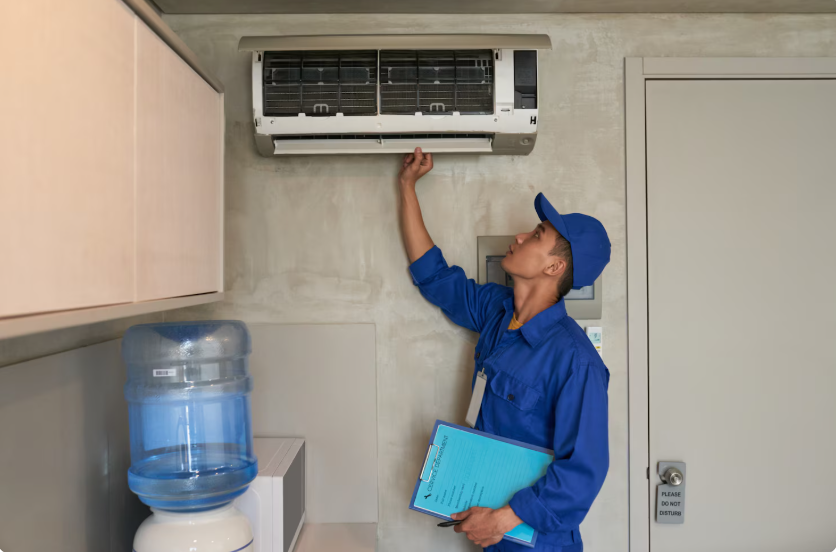News
When should you replace your 20x25x1 air filter?

Maintaining optimal indoor air quality is essential for a healthy home environment. The air filter in your HVAC system is a critical component in achieving this goal by trapping airborne particles and pollutants. Unfortunately, many homeowners underestimate the significance of timely air filter replacements. Neglecting this simple task can result in reduced HVAC efficiency and pose potential health risks due to poor air quality. In this comprehensive guide, we will explore the importance of replacing your 20x25x1 air filter regularly, outlining specific indicators and reasons to prioritize this aspect of home maintenance.
Understanding the Importance of Air Filters:
Air filters play a crucial role as the primary barrier against airborne contaminants like dust, pollen, pet dander, mould spores, and various pollutants, including the prevention of a Clogged Furnace Filter. By capturing these particles, they prevent them from freely circulating and accumulating within your home, thus ensuring cleaner, healthier indoor air. However, as time passes, air filters inevitably accumulate debris, gradually becoming clogged and less efficient. This decline in effectiveness compromises the filter’s ability to maintain optimal indoor air quality, necessitating regular replacement to uphold a clean and safe living environment for you and your family. Regular maintenance of air filters is paramount to sustaining efficient filtration and promoting better indoor air quality.
Factors Influencing Air Filter Lifespan:
Several factors determine how frequently you should replace your 20x25x1 air filter:
- Environmental Conditions: Homes located in areas with high pollen counts, pollution, or construction sites may require more frequent filter replacements.
- Occupancy: The number of occupants in your home, as well as the presence of pets, can increase the rate at which the filter accumulates debris.
- HVAC Usage: The frequency and duration of HVAC system usage impact how quickly the filter becomes clogged.
- Filter Type: Different types of air filters have varying lifespans. Basic fibreglass filters typically need replacement every 30 days, while higher-quality pleated filters can last up to 90 days or more.
Indices That Your Air Filter Needs to be Replaced:
Knowing when to replace your 20x25x1 air filter is crucial for maintaining indoor air quality and maximizing HVAC efficiency. Look out for these signs:
- Reduced Airflow: If you notice weak airflow from your vents, it could indicate a clogged air filter obstructing proper airflow.
- Increased Energy Bills: A dirty air filter forces your HVAC system to work harder to maintain desired temperatures, resulting in higher energy consumption and increased utility bills.
- Dust Buildup: Excessive dust buildup on surfaces throughout your home, despite regular cleaning, suggests that your air filter is no longer effectively trapping airborne particles.
- Allergy Symptoms: Worsening allergy symptoms, such as sneezing, coughing, or itchy eyes, may indicate poor indoor air quality due to a dirty air filter.
Frequency of Replacement:
While general guidelines suggest replacing your 20x25x1 air filter every 30 to 90 days, it’s essential to assess your specific circumstances. Regularly inspecting your filter is key to determining when replacement is necessary. Here’s a suggested timeline based on common scenarios:
- Light Usage: If you live alone or with a small family in an area with minimal pollution and don’t have pets, you can likely replace your filter every 90 days.
- Moderate Usage: For households with average occupancy and pet ownership, consider replacing the filter every 60 days.
- Heavy Usage: Homes with multiple occupants, and pets, or located in areas with high pollen or pollution levels may require monthly filter replacements.
Choosing the Right Air Filter:
Take into account the following aspects when choosing a new air filter for your HVAC system:
- MERV Rating: Minimum Efficiency Reporting Value (MERV) indicates a filter’s ability to capture particles of different sizes. Higher MERV ratings offer better filtration but may restrict airflow. Aim for a MERV rating between 8 and 13 for optimal efficiency without compromising airflow.
- Filter Material: Choose a filter material that suits your needs and budget. Pleated filters offer superior filtration compared to fibreglass filters but come at a higher cost.
- Allergen Reduction: If allergies are a concern, opt for a filter specifically designed to capture allergens such as pollen, mould spores, and pet dander.
DIY Filter Replacement:
Replacing your 20x25x1 air filter is a straightforward task that can be done in a few simple steps:
- Avert the circulation of particles by turning off the HVAC system.
- Locate the filter slot, usually found near the return air duct or furnace.
- Take out and properly dispose of the old filter.
- Insert the new filter, ensuring it’s positioned correctly with the airflow arrow pointing toward the blower motor.
- Secure the filter in place and close the filter slot.
- Restart the HVAC system and keep an eye on its operation.
Conclusion:
Maintaining pristine indoor air quality is paramount for safeguarding your family’s health and overall well-being. By grasping the indicators signalling when to replace your 20x25x1 air filter and selecting the appropriate filter type tailored to your requirements, you actively contribute to upholding superior indoor air quality and extending the longevity of your HVAC system. Cultivating a habit of routinely inspecting and replacing your air filter ensures a consistent supply of fresh, clean air circulating throughout your home, fostering an environment conducive to enhanced comfort and improved respiratory health for all occupants. Prioritize this essential aspect of home maintenance to reap the benefits of healthier and more enjoyable living spaces for years to come.
News
4 Services CPAs Offer To Streamline Payroll Compliance

Payroll rules change fast. Penalties hit hard. You need to get paychecks out on time and correct every single cycle. A trusted CPA cuts through that pressure. A skilled firm checks your payroll steps, watches for risk, and keeps your records clean for any review. With the right support, you spend less time worrying about tax notices and more time leading your team. This blog explains the 4 services CPAs offer to streamline payroll compliance so you can stop guessing and start following clear steps. You will see how a CPA reviews worker status, tracks tax deadlines, sets up strong controls, and prepares for audits. For businesses that want local insight, CPA Denver can also guide you through state and city rules that often cause confusion. By the end, you will know which services you need now and how to ask for them.
1. Worker classification and pay setup
Payroll starts with one basic question. Who counts as an employee and who does not. If you get that wrong, every check after that is exposed. A CPA reviews how each person works and how you control the work. Then the CPA compares that picture with federal and state rules.
The CPA helps you:
- Sort workers into employee or contractor status
- Set pay types such as hourly, salary, and piece rate
- Apply overtime rules for non-exempt workers
- Set up sick leave and family leave pay where laws require it
The IRS explains common worker status tests on its independent contractor page. A CPA takes that guidance and translates it into simple steps for your payroll system. This help protects you from back pay, extra tax, and interest.
2. Tax withholding, deposits, and filings
Next, a CPA focuses on payroll tax. Every paycheck triggers rules from the IRS and your state. Late or wrong payments cause sharp penalties. A CPA builds a clear schedule so you know what to send and when.
The CPA can:
- Set up correct federal income tax withholding using Form W-4
- Apply Social Security and Medicare limits
- Handle state and local income tax where it applies
- Plan deposit dates for payroll taxes
- Prepare or review Forms 941, 940, W-2, and W-3
The IRS gives filing rules and dates in Publication 15. A CPA uses those rules to build a calendar for your business. You get a clear notice of each upcoming deposit and return. That structure cuts late fees and keeps your cash flow steady.
3. Payroll controls and recordkeeping
Strong records protect you when questions come up. They also help you spot mistakes before they spread. A CPA reviews how you track time, approve pay, and store documents. Then the CPA suggests controls that fit your size and tools.
Common controls include:
- Separate people who input time from people who approve it
- Review payroll reports before each pay run
- Reconcile payroll totals to your bank and general ledger
- Store pay records and tax forms for the required years
The U.S. Department of Labor explains basic record rules for wages and hours on its compliance pages. A CPA uses that base and adds state rules, which can be stricter. You end up with a simple checklist that your staff can follow every pay period.
4. Audit support and notice response
Even careful employers sometimes get a letter. It might come from the IRS, a state tax office, or a labor agency. The tone can feel harsh. A CPA gives calm support when that happens.
The CPA can:
- Read each notice and explain what it really asks for
- Check your payroll data against the issue raised
- Prepare clear responses and supporting records
- Talk with the agency on your behalf if you authorize it
With a CPA in your corner, you avoid rushed answers. You present clean records and simple explanations. That reduces extra questions and helps close the review faster.
How CPAs support payroll compliance: quick comparison
| Service | Main goal | Key risks reduced | Typical outcomes
|
|---|---|---|---|
| Worker classification and pay setup | Match worker status and pay rules to law | Back wages, reclassification, extra tax | Correct pay types and clean worker files |
| Tax withholding, deposits, and filings | Send the right tax amount at the right time | Late payment penalties and interest | On time deposits and accurate returns |
| Payroll controls and recordkeeping | Keep payroll data accurate and secure | Fraud, missing records, repeat errors | Strong checks and ready support documents |
| Audit support and notice response | Handle questions from agencies with care | Unpaid balances, extended exams | Faster resolution and lower stress |
How to choose the right CPA support
You do not need every service at once. Your needs change as your payroll grows. A short talk with a CPA helps you pick the right mix.
Consider three steps:
- First, list your current payroll tasks and who handles them
- Next, note any recent notices, late fees, or staff complaints
- Then, ask a CPA to review one full pay cycle from time entry to tax deposit
That single review often uncovers the most painful weak spots. From there, you can add support for just those gaps. Over time, you build a payroll system that runs with fewer surprises and fewer long nights.
News
Digital heart: how technology has rewritten the rules of love

Imagine: at the turn of the century, talking about meeting someone online sounded almost like an awkward confession that required justification. Today, millions of people open dating apps as naturally as they check their email or browse the news. We live in an era where finding a significant other has become as digital a process as ordering a taxi or buying tickets. And it’s not just convenience — it’s a revolution in how we understand relationships, intimacy, and the very nature of human connections.
When the whole world is at your fingertips
The digitization of personal life did not begin yesterday, but the last decade has seen explosive growth. Smartphones have become pocket matchmakers, and algorithms have taken on the role previously played by mutual friends or chance encounters. The statistics are impressive: according to research, about 40% of couples in developed countries now meet online. That’s more than through friends, colleagues, or in bars.
Why did this happen? There are many reasons, and they are not only related to technological progress. Modern people live at a frantic pace: work, study, projects, hobbies. There is a catastrophic lack of time for spontaneous encounters. In addition, social circles often become closed — we see the same people day after day, and it becomes increasingly difficult to go beyond our familiar environment.
Digital platforms solve these problems elegantly. They open up access to thousands of potential partners, allow you to find out basic information about a person in advance, and weed out obviously unsuitable candidates. Geography is no longer an obstacle — you can communicate with someone from another city or even another country. And for shy people, the screen becomes a kind of shield, behind which it is easier to express yourself and start a conversation without fear of instant rejection.
Interestingly, online dating has democratized the romantic market. Previously, the chances of meeting someone depended on appearance, social circle, and social status. Now, a profile in an app gives you the opportunity to talk about yourself, show your interests, demonstrate your sense of humor or depth of thought. This does not negate the importance of first impressions, but it gives more chances to those who might go unnoticed in real life.
From text to video: the evolution of online communication
The first generation of dating sites was quite primitive — static profiles, correspondence, photo exchange. It worked, but it created a problem: there was often a gap between the virtual image and the real person. People could correspond for months, idealizing each other, only to discover upon meeting that the other person did not live up to their expectations.
Video chats changed the situation dramatically. They became a bridge between the digital and physical worlds, allowing people to see their conversation partner as they really are, hear their voice, and pick up on intonations and facial expressions. Platforms such as Thunder Omegle or CooMeet.chat offer a format of live communication that is as close as possible to a real date, while retaining the advantages of the online environment — safety, the comfort of home, and the ability to interrupt the conversation without awkwardness.
The video format solves several important tasks at once:
- It confirms the person’s authenticity and that they match their profile photos.
- It allows you to assess non-verbal cues and emotional compatibility.
- It saves time on preliminary acquaintance before a face-to-face meeting.
- It reduces the risks associated with deception and fraud.
- It develops spontaneous communication skills in real time.
Psychologists note that video communication activates the same areas of the brain as a face-to-face meeting. We read micro-expressions on the face, react to the tone of voice, and feel the energy of the other person. This makes the acquaintance more comprehensive and helps to quickly understand whether there is real chemistry between people or whether it is just a successful correspondence.
The light and shadow of digital romance
It would be naive to think that the technologization of relationships is only beneficial. Like any powerful phenomenon, it has a downside. One of the main problems is the effect of endless choice. When you have hundreds and thousands of profiles in front of you, you get the illusion that your ideal partner is somewhere nearby, you just need to keep looking. People become more picky, less tolerant of flaws, and more quickly disappointed.
The swipe culture has turned dating into a kind of shopping. People are judged in a matter of seconds based on a couple of photos and a short description. This is superficial and often unfair — a bad selfie can hide an amazing personality, and a perfectly edited profile can hide emptiness. The speed and ease with which one can reject or be rejected creates a kind of emotional burnout.
Another pitfall is the gap between online image and reality. In the digital environment, it is easy to present oneself in the best light: choose the most flattering photos, think up witty responses, and hide uncomfortable aspects of one’s personality.
Some people become so immersed in creating the perfect virtual “me” that they lose touch with their own authenticity. And when it comes to meeting in real life, the masks come off, and it can be painful for both parties.
Research also shows that excessive use of dating apps can affect self-esteem. Constantly comparing yourself to others, depending on likes and matches, and fearing rejection all create psychological stress. Young people are especially vulnerable, as digital validation becomes a key indicator of their self-worth.
What awaits us tomorrow
Technology is not standing still, and the future of online dating promises to be even more exciting. Artificial intelligence has already learned to analyze people’s compatibility not only based on profile data, but also on behavior patterns, communication style, and even voice tone. Virtual reality is preparing to offer full-fledged dates in digital space, where you can walk through virtual parks or sit in a simulated café while being on opposite sides of the world.
But no matter how far progress goes, it is important to remember the main thing: technology is a tool, not a substitute for real human feelings. Algorithms can bring people together, but only people themselves are capable of creating true intimacy. No app can replace the ability to listen and hear, accept your partner’s flaws, and work on your relationship during difficult times.
The digital revolution has given us incredible opportunities to find our soul mate. It has broken down old barriers and limitations, giving millions of people who would otherwise never have met a chance to connect. But success depends on how wisely we use these tools. The main thing is not to get lost in endless swiping, not to forget that behind every profile is a real person with their own hopes and fears. And that true love requires not only a successful matching algorithm, but also a willingness to open your heart.
News
5 Common Myths About Veterinary Visits Debunked

Many people avoid veterinary visits because of fear, cost, or past frustration. As a result, pets miss early signs of pain and disease. You may worry your pet will be stressed, that vaccines are unsafe, or that indoor pets never need checkups. These beliefs feel true when life is busy and money is tight. Yet they quietly put your pet at risk. This blog cuts through five common myths about vet visits and shows what actually protects your pet. It draws on what teams at an animal hospital in Guelph see every day. You will see how regular exams catch problems early, how modern clinics reduce stress, and how honest talks about cost give you real control. By the end, you can walk into your next appointment with clear expectations and less fear. Your pet depends on your choices.
Myth 1: “My pet looks healthy, so we can skip checkups.”
Pets hide pain. That is how many animals survive in the wild. By the time you see clear signs, the disease is often advanced.
During a routine exam, the vet checks:
- Heart and lungs
- Teeth and gums
- Eyes, ears, and skin
- Joints and weight
Each check looks simple. Together, they can uncover heart disease, kidney problems, arthritis, and early cancer. The Centers for Disease Control and Prevention explains that healthy pets also protect human health. Regular care lowers the risk of germs that pass between pets and people.
Here is how “my pet looks fine” can differ from what the vet finds.
| What you see at home | Possible hidden problem | What the vet may detect early
|
|---|---|---|
| Normal eating with slight weight loss | Thyroid or kidney disease | Abnormal bloodwork and heart changes |
| “Dog breath” that seems usual | Dental infection | Loose teeth and gum disease |
| Slowing down with age | Arthritis or heart disease | Pain on joint movement or heart murmur |
| Staying quiet in one room | Chronic pain or low mood | Tense muscles and high pulse |
Early treatment costs less. It also spares your pet long suffering.
Myth 2: “Vaccines are unsafe and do more harm than good.”
Fear of vaccines is strong. Yet the evidence is clear. Vaccines prevent deadly diseases in pets and protect people.
The American Veterinary Medical Association explains that vaccine reactions are uncommon. When they occur, they are usually mild and short. Common signs include:
- Tiredness for one day
- Slight swelling at the shot site
- Low appetite for one meal
Severe reactions are rare. Vets track them and adjust vaccine plans when needed. You can ask about:
- Core vaccines that protect from deadly disease
- Noncore vaccines based on lifestyle and risk
- Length of protection and booster timing
You protect your pet when you vaccinate. You also protect children, seniors, and people with weak immune systems who live with or visit your home.
Myth 3: “Indoor pets do not need regular vet visits.”
Indoor pets face fewer outside threats. They still face disease, injury, and age.
Cats and small dogs often hide sickness for months. They may use the litter box less, sleep more, or eat a bit less. These changes can be early signs of:
- Diabetes
- Kidney disease
- Heart disease
- Dental disease
Indoor pets also gain weight easily. Extra weight strains joints and the heart. A yearly exam lets your vet track weight, adjust food, and plan play that fits your pet.
Even indoor pets need protection from rabies and some parasites. Wildlife can enter yards and homes. Fleas and ticks can ride in on clothing. Simple tests and preventives limit this risk.
Myth 4: “Vet visits only matter during emergencies.”
Emergency visits are urgent, costly, and frightening. Preventive visits are calm, planned, and focused on your control.
During routine care, you and your vet can:
- Review food, treats, and weight goals
- Plan parasite prevention
- Discuss behavior issues before they grow
- Set up bloodwork for older pets
Here is a simple comparison.
| Routine visit | Emergency visit
|
|---|---|
| Scheduled at a good time for you | Unplanned and often at night |
| Lower and more predictable cost | High cost with added tests |
| Pet often calm and stable | Pet in pain or distress |
| Focus on prevention and planning | Focus on crisis and fast choices |
You lower the chance of a crisis when you keep up with routine visits. You also protect your budget and your peace of mind.
Myth 5: “My pet will be too stressed at the clinic.”
Fear is real for many pets. Clinics now use methods that reduce stress for both pets and families.
You can ask your vet team about:
- Waiting in your car until a room is ready
- Separate cat and dog spaces
- Quiet exam rooms with soft surfaces
- Slow handling with treats and praise
You can also help at home. You can:
- Leave the carrier out all week with a soft blanket
- Take short car rides that do not end at the clinic
- Bring a favorite toy or towel that smells like home
Some pets need medicine before visits to ease fear. This is not a failure. It is kind care that allows safer exams and procedures.
Taking the next step
Myths grow in silence. Honest talks with your vet replace fear with clear choices. You protect your pet when you:
- Schedule regular exams based on age and health
- Keep vaccines and parasite prevention up to date
- Call early when you notice even small changes
Your pet cannot speak. You speak through the choices you make. Regular veterinary care turns a quiet risk into clear action.
-

 All5 days ago
All5 days ago10 Questions People Often Ask About Online Games
-

 Business2 days ago
Business2 days ago6 Signs Your Air Conditioner Needs Immediate Repair
-

 Health2 days ago
Health2 days ago3 Benefits Of Combining Family And Cosmetic Dentistry In One Office
-

 News5 days ago
News5 days ago4 Services CPAs Offer To Streamline Payroll Compliance
-

 Travel3 days ago
Travel3 days ago10 Smart Tips for an Unforgettable Road Trip Adventure




